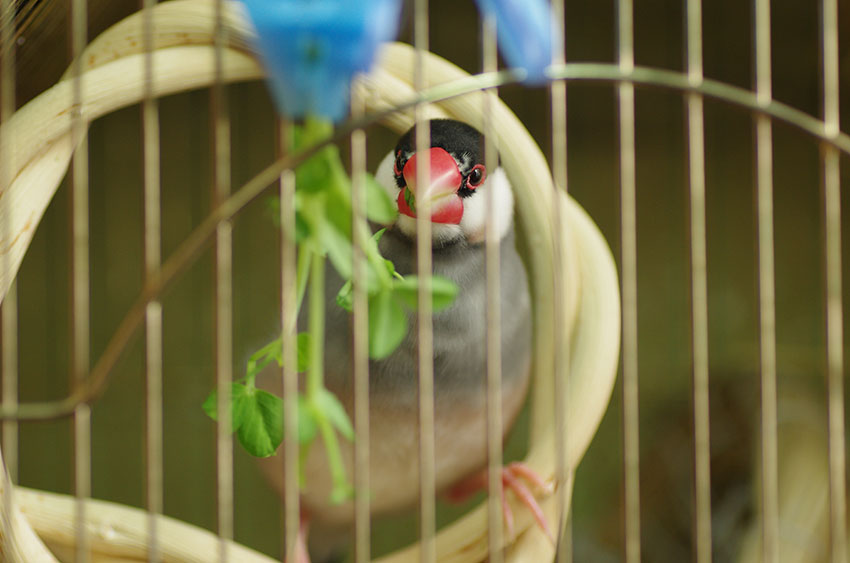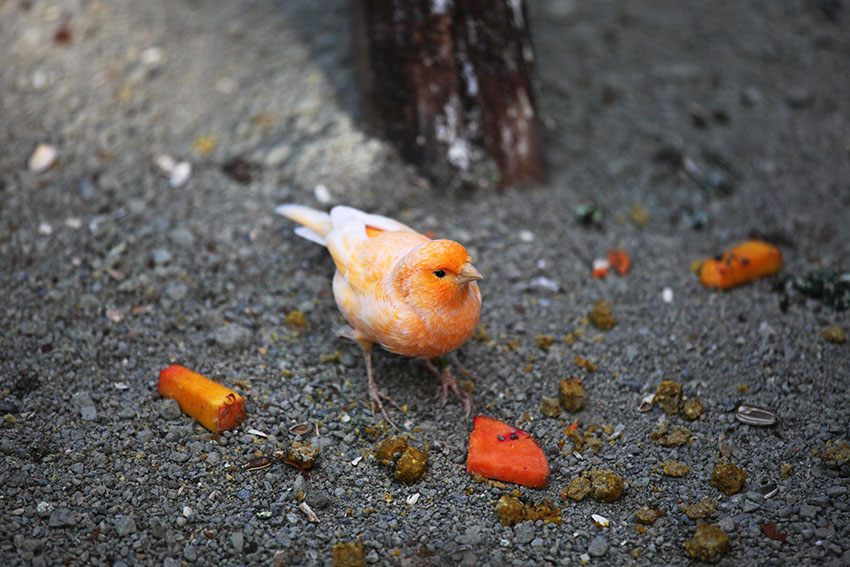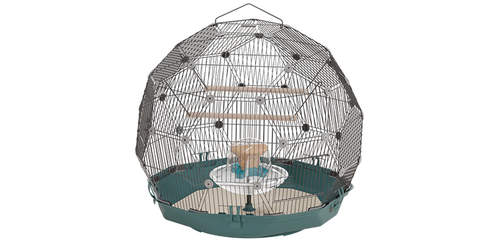Fruits and veg should be fed daily, making up 50% of the food offered to your finches (25% if you are feeding pellets). All leftovers need to be removed from the cage at the end of the day, as they quickly spoil and rot (or attract mice, rats and wasps in aviaries).

Food fit for a Java Sparrow
Finches are generally unfussy and will enjoy any suitable vegetables you offer. A mixture of bright colours appeals to them, so mix green courgette and broccoli with red apple and bell pepper, orange carrot and butternut squash, yellow corn cobs and… well, you get the idea. The key here is to provide food that is good for the birds, and to avoid ones that can upset their stomachs. As a starting point, try to source organic food, and always wash it well before serving to the birds.
Suitable Fruit and Vegetables For Finches
- apple (avoid the pips: they contain small amounts of cyanide)
- banana
- beetroot
- bell peppers (all colours)
- blueberries
- broccoli (the sprouting varieties are best)
- butternut squash (and any other squash)
- cabbage (savoy, kale)
- carrot
- celery (leafy ends – the sticks themselves are too watery and will fill the bird without adding much nutrition)
- corn on the cob
- courgette (zucchini)
- fennel bulb (especially the feathery green parts)
- greens – try dandelion, chickweed, nasturtium, spinach, parsley, spring greens, mustard cress; but only in small quantities – an excess of greens can hinder calcium absorption
- mango
- melon
- papaya
- peach and nectarine
- pear (not the pips – for the same reason as apples, above!)
- peas – fresh from the pod
- pumpkin (and any other squash)
- raspberries
- strawberries
- sweet potato
- tomato (ripe – never green)
Unsuitable Foods for Finches
Never feed your birds the following:
- acorns
- alcohol of any kind
- aubergine (egg plant) – the stem and unripe parts are toxic, and finches don’t tend to be very interested in the flesh if there are other vegetables on offer
- avocado – this is both fatty and toxic
- beans – no uncooked bean is suitable
- broad beans (fava beans)
- caffeine
- chocolate or any other sweets and confectionary aimed at sweet-toothed humans
- citrus fruits – these are fine in very small amounts, but too much can cause digestive problems and loose droppings
- elderberries
- fruit stones, pits and pips – most of these are mildly toxic (or, in the case of peach stones, lethal)
- garlic – opinion is split on whether the garlic and onion family is okay for finches, and wherever there is doubt, it’s easier to simply avoid
- lettuce – not toxic, but of very low nutritional value, so there’s no point having your birds filling up on it. It can also turn droppings watery if eaten in bulk.
- mushrooms of any kind
- nettle
- onion – see garlic, above
- peanuts
- potato – these are mildly toxic when raw
- rhubarb – the leaves are toxic
- sweet pea
- tobacco
Dried Fruit and Veg for Finches
Finches enjoy dried food, but you should avoid giving them too many sweet treats such as raisins and sultanas. You can buy prepacked dried fruit and veg, and as long as it’s organic and without preservatives or colourings (sulphur is one to watch out for, as it’s routinely used to colour things like dried apricot), it’s a suitable finch foodstuff. The one advantage of dried food is that it doesn’t spoil as quickly as fresh fruit and veg. Many finches enjoy the texture, too, and some like to put the bits of the mix in their water trays, eating it when it has partially rehydrated. Dry food can also be a handy bridge between seed and fresh food if your seed-addicted bird is reluctant to add new stuff to his diet.

Dry food and fresh food each have their place in your pet finch's diet
Preparing Fresh Food for Finches
Hard vegetables and fruits such as carrots, squash and unripe pears should be finely chopped or grated. Greens can be left whole or chopped – it’s a good idea to mix the fresh foods together, though, so chopping usually works best. If serving sprigs of greens separately (dandelion, for example – a particular favourite with many finches), leave them whole, and tie together in a bunch for the birds to snip with their beaks.
Serve fresh food on feeding stations away from the dried food – any fresh stuff landing in the dry seed will encourage rotting. If you have an aviary, the fruit and veg can be served on the floor. In the wild finches search for fruits and seeds on the ground, so this appeals to their natural instincts.




Comments
Lynne, 18 April 2024
I have an elderberries bush which is fruiting really well this year, I noticed a lot of silver eye finches feasting on the ripe berries yesterday. This site says not to feed them to finches. Please tell me I haven't handed the bird. I will pull the plant out of I have to.
Matt, 14 July 2021
Lionardo Di Vinci used to buy them to free them from their cages. I'd do the same but it would only make the traders keep selling them...oh, along with you lot. I'm here because we have one in the warehouse and trying to figure how to get him out. I know they're cute but....
Myhomegrocers, 24 March 2021
Good article. Will follow your article. Thank you. indian grocery store dallas tx
Rev, 20 May 2020
May be the strawberries.i dkn how ever our Canary's and Finches love our chop.ive heard if you put a strawberry in salt water bugs/ small worm like creatures crawls out.try it may be that's what your birds are seeing that we caint.just a thought
Joe, 17 April 2020
Just started with 2 Zebra finches which bred 5 females and one male which I went to separate and gave them all different partners as I did not want the young ones to breed among themselves as they from 1 set off parents.And now have got me Goudinian Finches which colours are adorable would like any advice to make them Extremely Happy